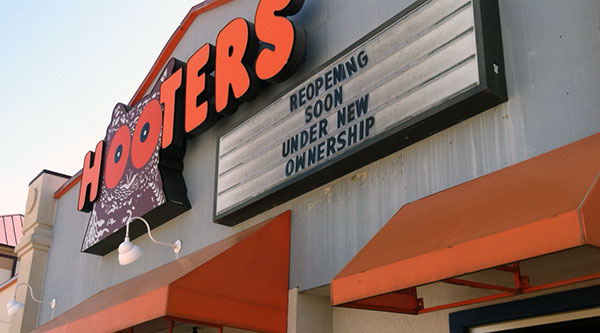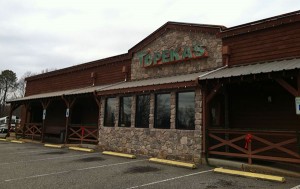
The Hooters at 2401 West Hundred Road. (Photo by Michael Schwartz)
A Midlothian bank claims a bankrupt local businessman lied about his assets and wants a court’s help to get back at least some of what it loaned.
Bank of Virginia filed a case this month in Richmond federal court to prevent Phil Cornett, who previously owned local Hooters locations, from being able to wash away debt owed to the bank through his personal bankruptcy.
The case claims Cornett owes a combined $2.7 million on two loans from Bank of Virginia to two of his business interests. One of those is Cornett Hospitality, through which he ran his once-thriving string of mid-Atlantic restaurants.
Cornett, who filed personal bankruptcy in October after much of his restaurant businesses collapsed, personally guaranteed both business loans, according to the case. The bank won judgments on the unpaid loans in 2011. But the debts remain unpaid, the case states.
Bank of Virginia is leaning on a provision in bankruptcy law that allows creditors to have debt discharged from a bankruptcy case if the debt was obtained with false financial statements and if the bank relied on those statements when lending the money.
Bank of Virginia claims it learned of such an instance with Cornett during his personal bankruptcy hearings, according to the filings.
“Based on the debtor’s testimony at the initial meeting of creditors, the financial statements… are, and were when delivered to the lender, materially false,” Bank of Virginia claims.
Richmond attorney Leonard Starr represents Cornett in his personal bankruptcy case.
“He certainly will respond vigorously,” to the complaint, Starr said.
The debt owed to Bank of Virginia is just a portion of the millions of dollars claimed by creditors in Cornett’s personal bankruptcy case.
Much of that debt is related to Cornett’s past business operations. Most of those are tied up in the separate bankruptcy of Cornett Hospitality, which was filed in late 2012 as the company fell behind on rent and loan payments.
At one time, Cornett ran more than a dozen eateries in three states which in addition to Hooters included Topeka’s Steakhouse and Max & Erma’s. But the business’ bankruptcy couldn’t prevent the company’s eviction from most of its restaurants.
Both the business and personal bankruptcy cases are Chapter 7 filings; a trustee will sell off Cornett’s assets to pay back at least some of his creditors. Both cases are still being worked out.
“His affairs, understandably, were fairly complicated,” Starr said.
Some of Cornett’s largest creditors in his personal bankruptcy include Arizona-based REIT Spirit Realty Capital, Bank of Virginia, Central Virginia Bank, EVB, StellarOne Bank and others.
Some of the debt is secured by his home at 5908 Three Chopt Road next to Country Club of Virginia, according to court filings. The 5,700-square-foot home was most recently assessed at $1.23 million.
Cornett’s response to Bank of Virginia’s claims is due April 3.
Bank of Virginia is represented in the case by Kaufman and Canoles attorney Paul Campsen. Messages left for Campsen were not returned.

The Hooters at 2401 West Hundred Road. (Photo by Michael Schwartz)
A Midlothian bank claims a bankrupt local businessman lied about his assets and wants a court’s help to get back at least some of what it loaned.
Bank of Virginia filed a case this month in Richmond federal court to prevent Phil Cornett, who previously owned local Hooters locations, from being able to wash away debt owed to the bank through his personal bankruptcy.
The case claims Cornett owes a combined $2.7 million on two loans from Bank of Virginia to two of his business interests. One of those is Cornett Hospitality, through which he ran his once-thriving string of mid-Atlantic restaurants.
Cornett, who filed personal bankruptcy in October after much of his restaurant businesses collapsed, personally guaranteed both business loans, according to the case. The bank won judgments on the unpaid loans in 2011. But the debts remain unpaid, the case states.
Bank of Virginia is leaning on a provision in bankruptcy law that allows creditors to have debt discharged from a bankruptcy case if the debt was obtained with false financial statements and if the bank relied on those statements when lending the money.
Bank of Virginia claims it learned of such an instance with Cornett during his personal bankruptcy hearings, according to the filings.
“Based on the debtor’s testimony at the initial meeting of creditors, the financial statements… are, and were when delivered to the lender, materially false,” Bank of Virginia claims.
Richmond attorney Leonard Starr represents Cornett in his personal bankruptcy case.
“He certainly will respond vigorously,” to the complaint, Starr said.
The debt owed to Bank of Virginia is just a portion of the millions of dollars claimed by creditors in Cornett’s personal bankruptcy case.
Much of that debt is related to Cornett’s past business operations. Most of those are tied up in the separate bankruptcy of Cornett Hospitality, which was filed in late 2012 as the company fell behind on rent and loan payments.
At one time, Cornett ran more than a dozen eateries in three states which in addition to Hooters included Topeka’s Steakhouse and Max & Erma’s. But the business’ bankruptcy couldn’t prevent the company’s eviction from most of its restaurants.
Both the business and personal bankruptcy cases are Chapter 7 filings; a trustee will sell off Cornett’s assets to pay back at least some of his creditors. Both cases are still being worked out.
“His affairs, understandably, were fairly complicated,” Starr said.
Some of Cornett’s largest creditors in his personal bankruptcy include Arizona-based REIT Spirit Realty Capital, Bank of Virginia, Central Virginia Bank, EVB, StellarOne Bank and others.
Some of the debt is secured by his home at 5908 Three Chopt Road next to Country Club of Virginia, according to court filings. The 5,700-square-foot home was most recently assessed at $1.23 million.
Cornett’s response to Bank of Virginia’s claims is due April 3.
Bank of Virginia is represented in the case by Kaufman and Canoles attorney Paul Campsen. Messages left for Campsen were not returned.



